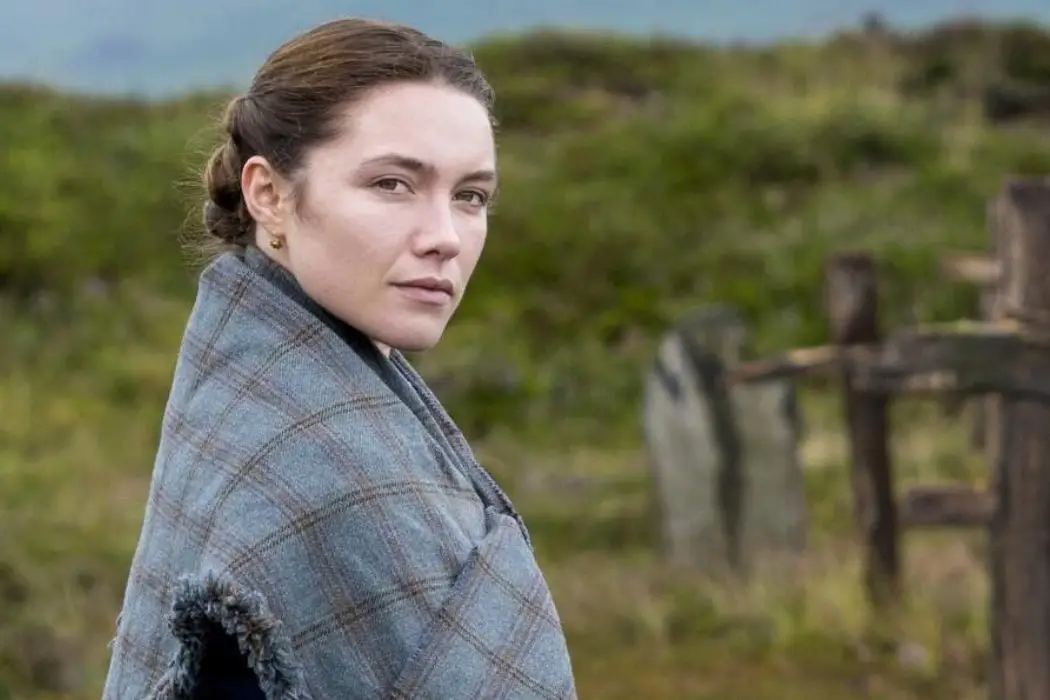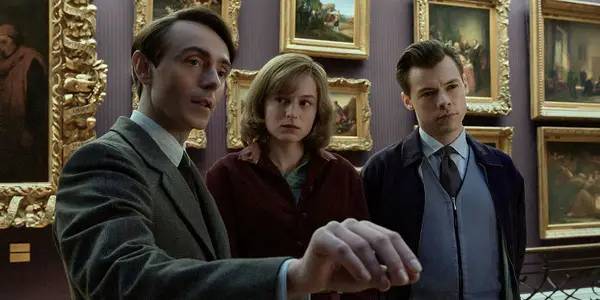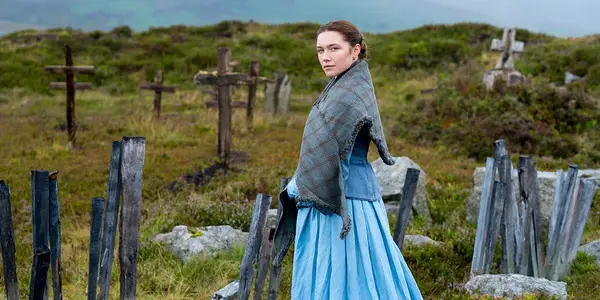Toronto International Film Festival 2022: MY POLICEMAN & THE WONDER

Wilson is a cinema enthusiast based out of Toronto, Canada.…
Aside from sharing production credits in the United Kingdom, the following two films playing at the Toronto International Film Festival could not be any more different. Michael Grandage‘s My Policeman is a starring vehicle for Harry Styles that will more than likely appease his fans (and no one else). And Sebastián Lelio’s The Wonder is a starring vehicle for Florence Pugh, that should be satisfying for all parties involved.
My Policeman (Michael Grandage)

What could have been a nuanced depiction of repressed love and regret, My Policeman is unfortunately a blunder in storytelling that lacks any fervent passion. Michael Grandage has packaged a lot of talent together, but the sum of all parts just doesn’t add up. Harry Styles fan will likely still be happy, but fans of cinema will likely disagree.
Taking place in 1950s Britain, schoolteacher Marion (Emma Corrin) falls in love with a closeted gay police officer Tom (Styles), who has a love affair with their mutual friend, Patrick (David Dawson). As their romantic affair becomes apparent to Marion, new tensions are formed on the backdrop of overt societal homophobia during that time period. Older versions of each character in the 1990s are played by Gina McKee, Linus Roache and Rupert Everett.
Not surprisingly, the performances in My Policeman are relatively solid throughout, with Styles not necessarily matching up to his contemporaries, but still holding his own. Corrin shines the brightest here, despite her character making questionable choices in a manner that could have been fleshed out more. Dawson is fairly impressive, and likely bolsters Styles‘ performance with his veteran experience as an actor. Everett unfortunately has much less to do as a result of his character’s physical ailments, particularly compared to McKee and Roache.
But performances aside, it’s hard to laud My Policeman in any other noteworthy way. Despite having lush cinematography and a gracefully moving score, the primary element of romance is simply lacking here. The film is quite physically open with Tom and Patrick’s relationship, but their romance just isn’t as moving as Grandage likely intended. The more one-sided affection between Mario and Tom works better, but isn’t enough to form a convincing love triangle of sorts, which should have been a cornerstone of the narrative. This was perhaps a result of a screenplay that tries to traverse a lot of ground with respect to plot, rather than staying afoot with character development. Each character’s internal dialogue is hard to decipher when the story moves across so many different settings and events.
As a result of this lack of internal clarity, when the film reaches its climatic reveal that is supposed to move the narrative across the finish line, the result is void of the emotional impact it so direly needs. Even when the film drums up dramatic inferences with its honest depiction of how homophobic British society was in the 1950s, it leaned in the right direction, but never seemed to fully cross over. These observations helped ribbon off an experience that was well acted and visually sound, but rather lacklustre in terms of its romantic qualifications, which should be instrumental for a film like this. Grandage had good intentions and seemed to be adapting material near and dear to his heart, but fell short of creating something truly impactful.
The Wonder (Sebastián Lelio)

Blending religious zeitgeist with elements that touch on the supernatural, Sebastián Lelio’s The Wonder is a mysterious calamity that is both haunting and inviting at the same time. Even if everything doesn’t necessarily come together in a fully cohesive way, the experience is emotionally fulfilling nonetheless. Not surprisingly, Florence Pugh is outstanding, and continues an upward trajectory as one of the industry’s most illustrious actresses.
Setting the tone for a film that bends away from a typical narrative, the film starts off on a modern day film set, with the camera slowly panning across different stages before transforming into 19th century Ireland. Lib Wright (Pugh), a veteran nurse during wartimes, is hired to observe a 11-year-old girl, Anna (Kíla Lord Cassidy), who has been refusing to eat for months. The village seems to think that this might be one of god’s miracles at work, but Lib grows increasingly suspicious as she spends more time with Anna and her family. Based on a novel by Emma Donoghue, with supporting turns from the likes of Ciarán Hinds, Niamh Algar, Toby Jones and Tom Burke.
The way in which The Wonder starts off on a modernized film set is delectably mysterious, and deliberately sets the tone for what is clearly an enigmatic story. Lelio creates this ominous tone that permeates the film, which coincides with the uncertainties surrounding Anna’s circumstances. This is in large part due to Ari Wegner’s rich visual prowess, capturing the film with a flat and grainy palette that feels strikingly colourful. Matthew Herbert’s score is also a perfect accompaniment, searing in the background for the most part, but also blazes into the foreground when needed.
There’s a richness to The Wonder that articulates a detailed eye towards world building, tying into the film’s interest in exploring how truth and story are depicted. The film doesn’t go so far as to being meta in the traditional sense, but there’s a clear dissection of how stories were (and are) told in societal circles. Aligning this concept with the stronghold of religion and faith actually helps modernize the story, despite being a period piece. In the end, our interpretation of the story at hand, and whether we agree with the character’s actions, becomes a reflection of our collective moral tendencies at a given moment in time. It’s a powerful statement on storytelling, and how varied it can be.
Lelio has always been a talented filmmaker with a unique creative flare, and The Wonder is no exception. The final scene of the film probably could have lingered a bit longer to better solidify its grander message, but it doesn’t take away from what is still a thought-provoking and surprisingly thrilling narrative.
Does content like this matter to you?
Become a Member and support film journalism. Unlock access to all of Film Inquiry`s great articles. Join a community of like-minded readers who are passionate about cinema - get access to our private members Network, give back to independent filmmakers, and more.
Wilson is a cinema enthusiast based out of Toronto, Canada. He escapes from his day job by writing random thoughts about cinema on the internet. Although he has a longstanding penchant for Hong Kong cinema, he considers himself to be an advocate for Asian cinema in general. He has been attending the Toronto International Film Festival every year since 2005, and more of his work can be found on his website: www.wilson-kwong.com.












